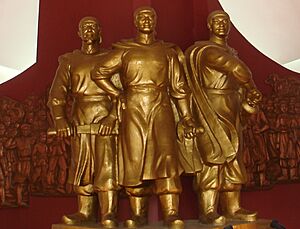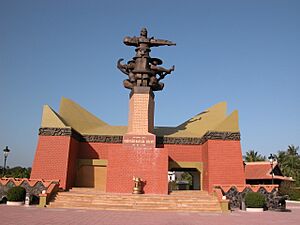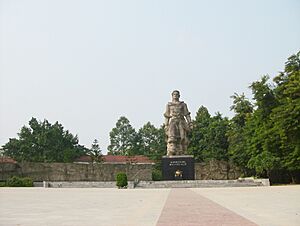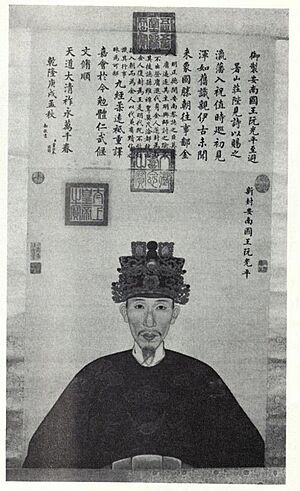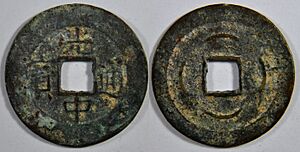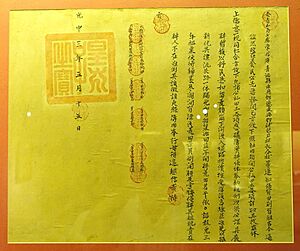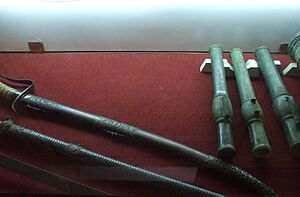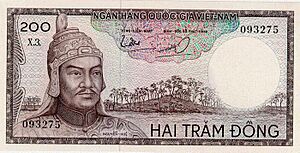Quang Trung facts for kids
Quick facts for kids Emperor Quang Trung光中帝 |
|||||||||||||||||
|---|---|---|---|---|---|---|---|---|---|---|---|---|---|---|---|---|---|
| Great Emperor of Đại Việt | |||||||||||||||||
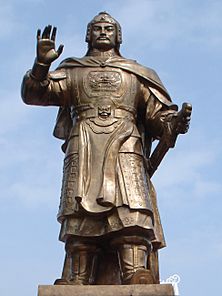 |
|||||||||||||||||
| Emperor of Tây Sơn dynasty | |||||||||||||||||
| Reign | 1788–1792 | ||||||||||||||||
| Coronation | 22 December 1788 Bân Hill, Phú Xuân |
||||||||||||||||
| Predecessor | Emperor Thái Đức | ||||||||||||||||
| Successor | Emperor Cảnh Thịnh | ||||||||||||||||
| Born | 1753 Bình Định, Đàng Trong, Đại Việt |
||||||||||||||||
| Died | 16 September 1792 (aged 38–39) Phú Xuân, Đại Việt |
||||||||||||||||
| Spouse | Phạm Thị Liên Bùi Thị Nhạn Lê Ngọc Hân Lê Thị Trần Thị Quỵ Nguyễn Thị Bích |
||||||||||||||||
| Issue |
see list
Nguyễn Quang Toản
Nguyễn Quang Bàn Nguyễn Quang Thiệu Nguyễn Quang Khanh Nguyễn Quang Đức Nguyễn Quang Thùy Nguyễn Quang Cương Nguyễn Quang Tự Nguyễn Quang Điện Nguyễn Thất Nguyễn Quốc Duy nine daughters |
||||||||||||||||
|
|||||||||||||||||
| House | Tây Sơn dynasty | ||||||||||||||||
| Father | Hồ Phi Phúc (or Nguyễn Phi Phúc) | ||||||||||||||||
| Mother | Nguyễn Thị Đồng | ||||||||||||||||
Emperor Quang Trung (1753 – 16 September 1792), also known as Nguyễn Huệ, was a very important leader in Vietnam's history. He was the second emperor of the Tây Sơn dynasty, ruling from 1788 to 1792. Nguyễn Huệ was also one of Vietnam's most successful military commanders.
He and his brothers, Nguyễn Nhạc and Nguyễn Lữ, were known as the Tây Sơn brothers. They led a big rebellion that changed Vietnam. They overthrew the old Later Lê dynasty and two powerful families, the Nguyễn lords in the south and the Trịnh lords in the north.
Nguyễn Huệ was a strong ruler and a great fighter. He died when he was only 40 years old. His death was a big loss for the Tây Sơn dynasty. His plans for Vietnam were not fully carried out. This made the empire weak. The Tây Sơn dynasty was later overthrown by Nguyễn Ánh, who started the Nguyễn dynasty in 1802.
Contents
- Early Life of Nguyễn Huệ
- The Tây Sơn Rebellion Begins
- Overthrowing the Nguyễn Lords
- Overthrowing the Trịnh Lords
- Civil War Between Brothers
- Ending the Lê Dynasty
- War with Qing China
- Peace with Qing China
- Quang Trung's Rule and Changes
- Plans to Invade China
- Final Years
- The Fall of the Tây Sơn Dynasty
- Legacy of Quang Trung
- See also
Early Life of Nguyễn Huệ
Nguyễn Huệ's family were farmers from Nghệ An. They moved south after a conflict between the Nguyễn and Trịnh families. His family name was Hồ, but they later used Nguyễn. Some say this was after his mother's family. Others say it was after the Nguyễn lords.
Nguyễn Huệ was born in 1753 in Tây Sơn village, which is now part of Bình Định Province. He was one of eight children. Three of his brothers joined the Tây Sơn Rebellion. Nguyễn Nhạc was the oldest, then Nguyễn Huệ, and Nguyễn Lữ was the youngest.
Nguyễn Huệ was known for being clever and good at fighting. He had bright, sharp eyes and a loud voice that made people respect him. His father made sure he and his brothers studied hard. Their martial arts teacher, Trương Văn Hiến, saw their talents early on. He encouraged them to do great things for their country.
Trương Văn Hiến told Nguyễn Nhạc about a prophecy: "Revolt in the West, success in the North." Since they were from Tây Sơn District (in the west), he urged them to act. Nguyễn Nhạc then gathered people to fight. He said they would "overthrow the Trịnh lords and bring back the Lê dynasty."
In 1771, Nguyễn Nhạc started the rebellion. His brothers, Nguyễn Huệ and Nguyễn Lữ, helped him. Nguyễn Huệ was very important in the early days. He helped with money and training the army. His skills made the Tây Sơn Rebellion very popular.
The Tây Sơn army grew strong. Many talented generals joined them, like Bùi Thị Xuân and Võ Văn Dũng. The rebels were famous for their fair rules. They only took from the rich and helped the poor.
The Tây Sơn Rebellion Begins
For 200 years, the Nguyễn Lords ruled southern Vietnam. But their government became weak. This was due to poor leaders and internal fights. After Lord Nguyễn Phúc Khoát died, a powerful official named Trương Phúc Loan took too much control.
The Tây Sơn Brothers started their rebellion to fight Trương Phúc Loan. They also wanted to help Prince Nguyễn Phúc Dương. The Tây Sơn army quickly took over central Vietnam. This weakened the Nguyễn government.
In 1774, the Nguyễn lords sent a large army to fight the Tây Sơn rebels. They recaptured some areas in central Vietnam. The Tây Sơn army then only held land from Phú Yên to Quảng Ngãi.
At the same time, the ruler of northern Vietnam, Trịnh Sâm, sent 30,000 soldiers south. Their goal was to help the Nguyễn Lords against Trương Phúc Loan. The northern troops easily reached Phú Xuân, the capital of the Nguyễn Lords.
The Nguyễn Lords were scared of fighting two enemies at once. They arrested Trương Phúc Loan and gave him to the Trịnh troops. But the Trịnh lords kept attacking Phú Xuân. The Nguyễn Lord Nguyễn Phúc Thuần and his officials fled to Quảng Nam.
Nguyễn Nhạc saw his chance. He led his army, with help from Chinese pirates, against the Nguyễn lords. Nguyễn Phúc Thuần fled again, this time by sea. He went to Gia Định with Nguyễn Phúc Ánh.
In early 1775, the Trịnh Lords' army reached Quảng Nam. The Tây Sơn troops were also there. Tây Sơn soldiers captured Nguyễn Phúc Dương. The Trịnh army then defeated the Tây Sơn troops.
Nguyễn Nhạc feared fighting on two fronts. He offered a deal to the Trịnh lords. If they recognized the Tây Sơn army, Tây Sơn would help them fight the Nguyễn Lords. The Trịnh lords agreed. Nguyễn Nhạc was made an official. He also made a temporary peace with the Nguyễn lords. This gave him time to make his army stronger.
Nguyễn Nhạc knew the peace would not last. He trained his army and built new bases. He prepared for more attacks. The Nguyễn general, Tống Phước Hiệp, was tricked by the peace deal. He did not prepare for battle.
Nguyễn Nhạc used this chance. He sent his brother Nguyễn Huệ to attack Tống Phước Hiệp. The Tây Sơn troops quickly defeated the unprepared Nguyễn Lords' army. This was a great victory for Nguyễn Huệ.
Overthrowing the Nguyễn Lords
The Trịnh Lords' army went back north because they didn't know the southern land well. Their general, Hoàng Ngũ Phúc, died on the way. This ended the Trịnh Lords' involvement in the south. The Tây Sơn army quickly took over the land the Trịnh had left. They also stopped anyone loyal to the Nguyễn Lords.
With new land and little resistance, the Tây Sơn army grew stronger. Nguyễn Nhạc wanted to expand their power. He sent his youngest brother, Nguyễn Lữ, to attack Gia Định (now Ho Chi Minh City) by sea. Lữ's attack was successful. He took Saigon and forced the Nguyễn Lord to flee.
But Lữ's success was short-lived. An army loyal to the Nguyễn Lords fought back. They forced Tây Sơn troops to leave Saigon. Before leaving, Lữ took all the local food supplies back to Quy Nhơn.
In 1776, Nguyễn Nhạc declared himself King of Tây Sơn. He made Đồ Bàn his capital and renamed it Imperial City. He gave Nguyễn Huệ the title of Vice National Administrator.
Southern Campaigns
In 1777, Nguyễn Huệ and Nguyễn Lữ led their army further south. They captured Saigon and defeated the Nguyễn lords' army. Most of the Nguyễn royal family were killed. Only Nguyễn Ánh escaped. He fled to Pulo Panjang with a French priest, Pigneau de Behaine.
After the battle, Huệ and Lữ went back to Quy Nhơn. They left only a small army in Gia Định. Nguyễn Ánh returned and took Gia Định the next year. With help from the French priest, Ánh got Western weapons and soldiers. He wanted to bring back the Nguyễn lords' rule.
In 1782, a Tây Sơn army led by Nguyễn Nhạc and Nguyễn Huệ took Gia Định again. Nguyễn Ánh had to flee to Phú Quốc. From Phú Quốc, Nguyễn Ánh and his supporters suffered from Tây Sơn attacks and lacked food.
Nguyễn Ánh went to Bangkok to ask for help from Siam (Thailand). In 1783, Nguyễn Ánh and his supporters went to Siam with the Siamese army. King Rama I of Siam welcomed Ánh. He promised to help Nguyễn Ánh get his kingdom back.
The Siamese army moved towards southern Vietnam in 1784. A large fleet with 20,000 men was sent to attack Saigon. Nguyễn Ánh and his supporters joined them. Siamese soldiers also marched through Cambodia.
Siamese troops defeated the Tây Sơn army in some places. They captured several areas in southern Vietnam. But they met strong resistance from the Tây Sơn army. They could not capture any important places. The Tây Sơn general, Trương Văn Đa, asked for help from Quy Nhơn.
Nguyễn Huệ arrived in Gia Định with more Tây Sơn soldiers in 1785. Huệ sent a message to the Siamese army, pretending to want peace. He acted scared and asked Siam not to help Nguyễn Ánh. This was a clever trick, and the Siamese general believed him.
On January 20, 1785, the Siamese fleet was surrounded in the Rạch Gầm and Xoài Mút Rivers. This battle, known as the Battle of Rạch Gầm-Xoài Mút, almost completely destroyed the Siamese fleet. The Siamese general and Nguyễn Ánh fled back to Bangkok.
Overthrowing the Trịnh Lords
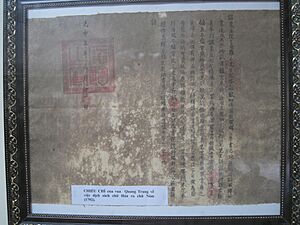
Northern Vietnam became very chaotic in 1786. An army led by Nguyễn Huệ marched north to attack Phú Xuân. The governor of Phú Xuân was not a good leader. Nguyễn Huệ launched a surprise attack. The governor surrendered to the Tây Sơn army.
After taking Phú Xuân, Nguyễn Huệ was encouraged to overthrow the Trịnh lord. He marched further north without Nguyễn Nhạc's order. The Tây Sơn army easily defeated the Trịnh troops. When they reached Thăng Long (modern Hanoi), the Trịnh lord, Trịnh Khải, came to fight.
The Tây Sơn army used guns against war elephants. They successfully captured Thăng Long. The next day, Huệ met Lê Hiển Tông. He said he only came to overthrow the Trịnh lords, not to take over. Lê Hiển Tông welcomed Huệ. He gave Huệ the title of "supreme commander." Huệ also married Lê Ngọc Hân, a daughter of the Lê Emperor.
The old emperor died a few days later. Lê Chiêu Thống was made emperor by Huệ. Even though Nguyễn Huệ was not yet an emperor himself, the people of Thăng Long treated him like one.
Nguyễn Nhạc did not want to control northern Vietnam. He sent a message to stop Huệ from marching north, but Huệ had already left. When he heard Huệ had captured Thăng Long, he realized Huệ was hard to control. Nhạc went north to meet Huệ and the Lê emperor. In Thăng Long, Nhạc promised not to take any land from the Lê emperor. Then, Nhạc and Huệ left Thăng Long.
Civil War Between Brothers
Later that year, Nguyễn Nhạc declared himself "the Central Emperor." Nguyễn Huệ was given the title "King of Northern Conquering." The area north of Hải Vân Pass was given to him. But soon, he and Nguyễn Nhạc had a conflict. A civil war started between them.
Nguyễn Huệ's army was stronger than Nhạc's. Huệ surrounded Quy Nhơn for several months. Nguyễn Nhạc's main forces from Gia Định came to help him, but they were defeated. Nhạc climbed the city wall and called out to Huệ, asking why brothers were fighting like this.
Nguyễn Huệ was touched by his brother's words. He decided to retreat. He made a peace agreement with Nhạc. They set a boundary: the area north of Quảng Ngãi was Huệ's, and the area south belonged to Nhạc. From then on, they stopped fighting each other.
Ending the Lê Dynasty
While Nguyễn Huệ was away, northern Vietnam became chaotic again. The Trịnh lord's rule was restored. Lê Chiêu Thống could not control the situation. He asked for help from Nguyễn Hữu Chỉnh. Chỉnh became the new regent, like the Trịnh lords before him.
When Huệ heard about Chỉnh's actions, he sent an army to attack Thăng Long. Chỉnh was quickly defeated and fled with Lê Chiêu Thống. Chỉnh was found and executed. But Nguyễn Huệ's general could not find Lê Chiêu Thống.
To gain support in northern Vietnam, a new regent was put in place. Two generals reported this to Huệ. Huệ marched north with his army and launched a surprise night attack. He captured and executed the general who had put the new regent in power.
Huệ then led his army back to Phú Xuân. The regent remained in his position. Other generals were left in Thăng Long to watch over him.
War with Qing China
Lê Chiêu Thống still wanted to get his throne back. He hid in the mountains. His mother asked for help from Qing China to bring back the Lê dynasty. The Qianlong Emperor of Qing China decided to help Lê Chiêu Thống.
Two large Chinese armies invaded Vietnam in November 1788. They marched south to attack Thăng Long. The Chinese general announced that his army was huge to scare the Tây Sơn soldiers. The Chinese marched quickly.
The Tây Sơn army realized they could not stop the Chinese from reaching Thăng Long. They abandoned Thăng Long and retreated in an orderly way. They sent a messenger to Phú Xuân to ask for help.
Nguyễn Huệ learned about the situation on December 21, 1788. He was angry at the invaders. Huệ declared that Lê Chiêu Thống was a traitor and not fit to be emperor. The next day, Nguyễn Huệ crowned himself Emperor Quang Trung. This meant the Lê dynasty was officially over.
After his coronation, he marched north with 60,000 soldiers. He recruited more volunteers in Nghệ An Province, bringing his army to 100,000 soldiers. He gave an inspiring speech to his soldiers. They cheered loudly and marched quickly.
Huệ arrived on January 15, 1789. He divided his forces into five groups. The main force, led by Huệ, marched directly to Thăng Long. Other groups attacked different areas, including with war elephants.
Meanwhile, the Chinese soldiers were getting ready to celebrate the Chinese New Year. They planned to attack Phú Xuân later. They thought the Tây Sơn army would not attack during the Vietnamese New Year (Tết). But they were wrong.
Nguyễn Huệ launched a surprise and fast attack during the New Year holiday. They reached Thăng Long on January 28, 1789. In a fierce four-day battle, most Chinese soldiers were unprepared. The Tây Sơn army defeated them badly in the Battle of Ngọc Hồi-Đống Đa. Many Chinese soldiers were killed or drowned.
The Chinese commander-in-chief fled back to China. Lê Chiêu Thống also fled to China. Huệ marched into Thăng Long. His clothes were black from gunpowder. The Tây Sơn army continued north, threatening to cross the border to capture Lê Chiêu Thống.
After Nguyễn Huệ defeated the Chinese, Lê Chiêu Thống and other Lê loyalists fled to Qing China. They were given positions in China. They even changed their clothes and hairstyles to fit in. This protected them from Vietnam's demands to send them back. Some Lê loyalists were sent to Central Asia.
Peace with Qing China
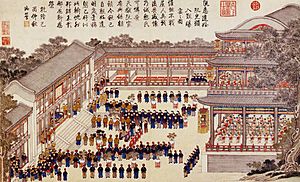
The Chinese emperor was very angry. He replaced his general. The new general did not want more conflict. He sent a letter to Nguyễn Huệ. He said that Huệ needed to apologize to the emperor for peace.
Nguyễn Huệ wanted to make peace with China. He wanted to prevent China and Siam from attacking Vietnam together. He also wanted to stop China from trying to bring back the Lê dynasty. So, Nguyễn Huệ sent a respectful request to the Qianlong Emperor. He used the name Nguyễn Quang Bình.
In 1789, the Qianlong Emperor agreed to make peace. He recognized Nguyễn Huệ as the king of Annam. But he had one condition: Nguyễn Huệ had to personally lead a special group to Beijing. This group would celebrate the Qianlong Emperor's 80th birthday. The Chinese emperor wanted to show his power and keep his southern border stable.
Both Chinese and Vietnamese sources agree that Nguyễn Huệ sent someone else to pretend to be him. This person went to Beijing with a group. They were treated very well by the Chinese emperor. The Qianlong Emperor approved the peace and gave Nguyễn Huệ the title "King of Annam." This meant Huệ was the official ruler of Vietnam, and Lê Chiêu Thống was no longer supported.
Quang Trung's Rule and Changes
Once he became emperor, Quang Trung started many big changes in Vietnam. Even though China called him "king of Annam," he always saw himself as the emperor of Đại Việt. He made Lê Ngọc Hân his empress. He also named Nguyễn Quang Toản as the Crown Prince.
Quang Trung decided to move the capital to Nghệ An Province. He ordered a new citadel to be built there. This new capital was called Phượng Hoàng Trung Đô.
He also changed the way the country was organized. He divided areas into smaller parts. He created new official positions to manage the government and the army.
Quang Trung also changed the military. He organized the army into five main groups. Every adult male had to join the army.
He also reformed taxes. Farmers had to pay a certain amount of grain as tax. There were also other taxes on farmland.
Quang Trung introduced an identity card system. This helped him keep track of the large population. Every adult male received a wooden card. It had his name, birthplace, and fingerprints. If someone did not have this card, they would be arrested.
Quang Trung also changed the official written language. He replaced the traditional Chinese script with the Vietnamese Chữ Nôm. Students had to write in Chữ Nôm for official exams. Many people criticized this at the time. But modern experts say it was a very forward-thinking idea.
He also made changes to religion. Many small Buddhist temples were combined into larger ones. Monks had to pass an exam. If they failed, they had to return to normal life. Quang Trung also allowed different religions to be practiced freely. This helped him gain support from Christians and common people.
Plans to Invade China
After defeating China, a Lê prince fled to northern Vietnam. He was supported by local leaders. This prince planned to start a revolt against the Tây Sơn dynasty. Quang Trung sent his army to conquer these areas. They captured the Lê prince and his supporters and executed them.
Horses, elephants, and war drums were taken as war prizes. Quang Trung sent them to China as gifts. He did this to show China his power. He also asked for tax exemptions and a trading house in China. The Qianlong Emperor agreed to these requests.
There was also a land dispute near the border between Vietnam and China. Vietnam claimed the land belonged to them. But Chinese leaders had taken it. Quang Trung wrote a letter to the Chinese general, asking for the land back. The general refused.
Quang Trung was angry. He began training his soldiers and building many large warships. He planned to invade China. It was said that Quang Trung did not respect the Qianlong Emperor. He told his ministers that if he had more time, he would not be afraid to fight China.
Nguyễn Huệ continued to train his army and build warships. He waited for a chance to get revenge on China. He also gave shelter to groups that were against the Chinese government. Chinese pirates were given official positions and titles under the Tây Sơn empire. With Tây Sơn support, the number of Chinese pirates grew quickly. They blocked sea routes and attacked China's coastlines. But Quang Trung died in 1792, so the attack on China never happened.
In 1792, Quang Trung decided to invade China. There is evidence he wanted to conquer southern China. He tried to arrange a marriage with a Chinese princess. He demanded that a part of China be given to Vietnam as a wedding gift. He knew the Chinese emperor would not agree. He just wanted an excuse for war. But he fell ill, so the messenger never left.
Final Years
Quang Trung suddenly became ill. The exact cause of his illness is not known. Some historians think he might have had a stroke.
Quang Trung called his general, Trần Quang Diệu, back to Phú Xuân. He planned to move the capital to the new city, Phượng Hoàng trung đô. At this time, he learned that Nguyễn Ánh had captured some southern provinces. He became very sad and grew critically ill.
On his deathbed, Quang Trung worried about the future of the Tây Sơn dynasty. He said his Crown Prince, Nguyễn Quang Toản, was clever but too young. He also said his brother, Nguyễn Nhạc, was too old and had given up.
His will said he should be buried within a month. All ministers and generals should work together to help the Crown Prince. He also said to move the capital to Phượng Hoàng trung đô as soon as possible. He warned that if they did not, Nguyễn Ánh would kill them all.
Quang Trung was buried secretly. The exact location is not clear.
Quang Trung was given the special name Thái Tổ and the title Vũ Hoàng đế by his successor, Nguyễn Quang Toản. Nguyễn Nhạc wanted to attend the funeral, but the road was blocked by Toản. Nhạc had to send his sister instead.
The plan to invade China was stopped. Nguyễn Quang Toản built a fake tomb for Quang Trung. He told the Chinese emperor that Quang Trung was buried there. He said it was because Quang Trung missed the emperor's palace. The Qianlong Emperor praised Quang Trung and wrote a special speech for him. He also sent an official to pay respects and recognized Nguyễn Quang Toản as the new "King of Annam."
The Fall of the Tây Sơn Dynasty
However, Nguyễn Quang Toản, who became Emperor Cảnh Thịnh, did not continue his father's policies. The identity card system was stopped. The capital stayed in Phú Xuân. High-ranking ministers and generals started fighting for power. This led to the decline of the empire.
The Tây Sơn dynasty was overthrown by Nguyễn Ánh in 1802. This happened after a ten-year war. Quang Trung's sons were captured alive. All of them died.
The Nguyễn dynasty, which came after, considered the Tây Sơn dynasty an illegal government. They called it "False Tây" or "Bandit Tây" in their official records. This was to show that they believed the Tây Sơn rule was not rightful.
Legacy of Quang Trung
Nguyễn Huệ is seen as a national hero in Vietnam. He is one of the most popular figures in the country's history.
He is honored in Vietnamese culture. A temple in Hanoi, Bộc Pagoda, is dedicated to him.
Nguyễn Huệ was shown on the South Vietnamese 200 đồng banknote.
Most cities in Vietnam have major streets named after him.
A Vietnamese film, Tây Sơn hào kiệt, was made about his story.
See also
 In Spanish: Nguyễn Huệ para niños
In Spanish: Nguyễn Huệ para niños
- Tây Sơn dynasty
- Tây Sơn military tactics and organization
- Battle of Rạch Gầm-Xoài Mút
- Battle of Ngọc Hồi-Đống Đa
- Đống Đa Mound


